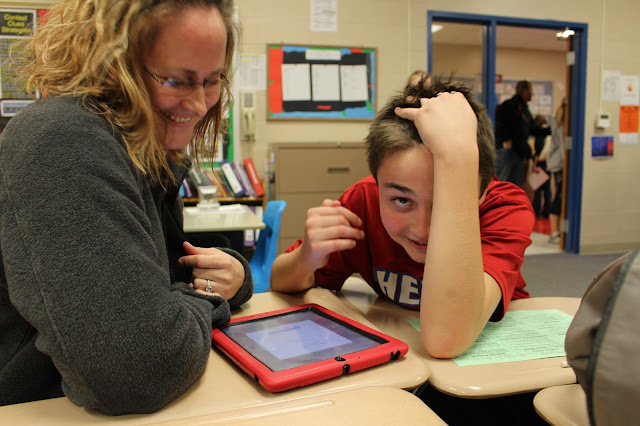If you need an awesome idea with a catchy title...look no further than Mrs. Harris' Tic Tac Toe, Show What You Know!
Everyone likes a simple game of tic tac toe and that’s what
my seventh graders did for student-led conferences this spring. Instead of
self-reflecting on projects and setting goals like I’ve had them do in the
past, students picked three activities from a grid of nine boxes. It was a showcase
of what goes on in my communications classroom.
 |
| The Tic Tac Toe paper. |
In preparing for this, some students were automatically
drawn to the paperless classroom choice.
They wanted to make their parents operate their iPad. But then they were
locked into certain other choices they might not have initially chosen. But
that’s okay. Stretching them to perform or explain something they’re weak in is
okay too.
 |
| The enjoyment of teaching a parent about a device! |
Of my 63 students this year, only one drew a crooked line on
the paper and said, “I can’t find three in a row. I want to do this instead.” I
said that wasn’t allowed, so we looked again at what was in the middle that she
was avoiding. When I took her to the part of the room to remind her of the
differences between singular possessives and plural possessives, she realized
she did know that.
 |
| Poetry Choices. |
 |
| I taught these parents too! |
Years ago our district made a deliberate choice to call this
class communications instead of language arts. We expect our students to do
just that. Communicate.
We read, write, listen, speak, research, act, produce,
design, and create. Of course I teach grammar and capitalization and vocab and
punctuation—but all within the context of quality literature. Sometimes it’s
fiction. Sometimes it’s nonfiction. It might be a novel. It might be through
technical or persuasive text. We write skits and act in them. We film them. We
edit them. We get irritated enough at each other that we have to say I’m sorry.
Sometimes it’s serious enough to ask for forgiveness. We know who’s good at coming
up with ideas and who can’t spell. We know who loves to act with their voice
and who never wants to get in front of a camera. We know who should design the
props or make the poster.
Less than a month into the school year, I know this about
each student.
I usually start telling them how they’ll react to certain
projects. I’ll say something like “Joan will love this, but Colby will hate it.
Amanda will choose this, but Adam will want to do it like that.” And it
surprises them that I know them so soon. But I have to. Because it’s my job to
capitalize on their strengths and make them work on their weaknesses.
No state test can measure that. No one assignment can do
that either. And in most cases, a student’s weakness isn’t as big of a weakness
near the end of the year. Some might be able to make it their strength. I love
it when that happens. I love watching them become what they can become.
So that’s why students had a smorgasbord of activities to
pick from at student-led conferences.
Oh, smorgasbord. Wonder if they know what that means. I feel
a vocab game brewing.